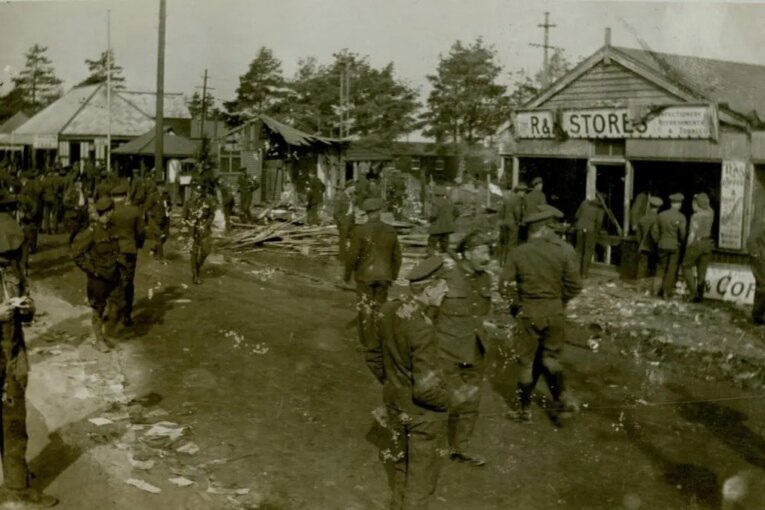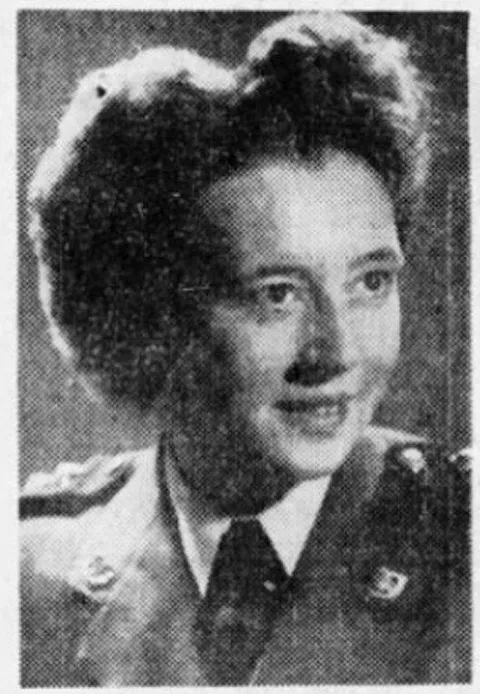
Gunner Charles McDonell stared at the distant horizon from the deck of the crowded troop carrier SS Tunisian, bound for Canada in November 1919. Soon to be reunited with wife Margery and four-year-old daughter Denys, in the year since the Armistice ended the First World War, McDonell had been through the wringer, twice convicted of mutiny, imprisoned and sentenced to death.
He was fortunate to be returning to Canada but haunted by images of war, carried a secret that altered the course of his life.
After four years of battle in dreadful conditions, members of the Canadian Expeditionary Force were homesick at the war’s conclusion. They longed for the resumption of life back in Canada. Demobilization couldn’t come fast enough. Repatriation of large numbers of soldiers proved challenging but went smoothly for the most part. In some demobilization camps, however, conditions weren’t ideal. Soldiers complained of substandard food quality and tobacco shortages. Tensions spiked over soldiers’ discontent with excessive discipline for seemingly minor infractions, unwarranted parading, and pointless marching.
Revolts were not unheard of. In one instance, five Canadian soldiers lost their lives in a two-day rampage at Kinmel Park Camp in North Wales in March 1919.
Charles McDonell became caught up in a similar disturbance in Tournai, Belgium. A week earlier, King George V, accompanied by the Prince of Wales, visited that war-shattered city. They met officials, toured a communication trench and raised morale among soldiers waiting to be repatriated.
The unrest began in the middle of a four-day march to Germany when troops reached the historic Belgian city on Dec. 14, 1918. The long march began two days earlier in Nivelle, France, with substandard rations that included a lack of bread and wormy meat.
Several battalions, including McDonell’s 3rd Canadian Machine Gun Battalion, refused orders to continue unless soldiers’ demands were met and conditions improved.
Divisional headquarters attempted to quell what they considered a mutiny and requested eight members be selected from various battalions to represent soldiers’ concerns to officers. The eight included McDonell, a vocal advocate for soldiers’ rights. The representatives met ranking officers, came to a compromise and returned to base camp to report findings to discontented troops. Headquarters had negotiated in bad faith. When the eight began addressing their comrades, each was arrested on the charge of leading a mutiny.
A month later, the Tournai Eight were tried and convicted. McDonell was sentenced by court-martial to five years’ imprisonment for attempting to persuade members of His Majesty’s Forces to join a mutiny and sedition. The others received similar sentences.
McDonell was confined to No. 7 Military Prison near Calais, France, and things went from bad to worse.
Charles Napoleon McDonell was born in 1891 in Ottawa, the second youngest of five. A bright, bookish child, his father published the Ottawa-based French-language newspaper Le Temps. In adulthood, Charles resided in Montreal, working first in a bookstore before becoming an assistant librarian at McGill University, all while writing novels, poems, criticisms and essays. His attestation papers list his occupation as a journalist. A handsome chap of medium height with grey eyes and light brown hair, he was also an amateur actor.
Beginning in 1914, when war broke out, he made six failed attempts to enlist. Married the same year, he soon became a father. He moved the family to New York City, writing for a local newspaper while seeking a publisher for his poetry collection. The formation of the 242nd Battalion in Montreal in 1916 brought him back to that city, where he joined. (Later in France, he transferred to the 3rd Canadian Machine Gun Battalion.)
In France, most inmates at No. 7 Military Prison were Australians and New Zealanders. About 10 were Canadian. Conditions were awful and beatings by guards not uncommon. McDonell protested the poor housing of inmates and refused to parade as required. Other inmates followed suit. Two days of rioting ensued. The governor of the prison called in troops. Instructions were issued to shoot any men trying to escape were issued. Prisoners reported witnessing an attempted escapee die after being shot and intentionally denied medical aid.
Participants in the riot were courtmartialed and sentenced to additional seven to 15 years. At McDonell’s trial, he refused to call witnesses, fearing they would face retribution, according to the other soldiers present who later spoke to the media upon returning to Toronto.
He addressed the military tribunal eloquently for more than an hour, chastising authorities over poor prison conditions. Despite his oratory, McDonell was convicted.
On March 24, 1919, on his second conviction for mutiny, he was sentenced to death by firing squad.
Back in Canada, McDonell’s wife Margery took up his cause. She relocated from Montreal to Toronto, believing getting a reduced sentence or a reprieve for him here would be easier. She went to the press to publicize his plight. In letters to Ottawa, she informed officials that all males in her family of fighting age had enlisted. Two of her husband’s older brothers fought in the Great War, and one was killed over France with the Royal Flying Corps. She solicited assistance from the Great War Veterans’ Association.
Through her advocacy, McDonell avoided death by a fusillade of bullets. He received a pardon.
Seven months later, his discharge certificate was stamped “misconduct,” and he sailed for home aboard the SS Tunisian. Docking in Quebec City, he made his way to Toronto by train, where he was greeted by his wife and daughter, along with Mayor Tommy Church and an organizer from the Great War Veterans’ Association.
The seven others convicted with McDonell also received pardons and eventually made their way back to Canada. Unlike McDonell, who shunned the press, some shared their experience with the public.
McDonell returned to civilian life a husk of the man he once was. Traumatized by the carnage of war, a secret prevented him from resuming domestic life with Margery and Denys.
Gunner McDonell had fallen for a fellow soldier. It was a brief affair. The two fought alongside one another. During a lull in an engagement with the enemy, McDonell found his lover’s body torn to pieces in a trench. The image haunted him for his remaining days.
On this side of the Atlantic, he struggled with depression. Acquaintances described him as charming but gloomy. He left Margery and Denys and settled in New York’s Greenwich Village, doubling down on his desire to find a publisher for his poetry collection. He befriended renowned gay poets Elsa Gidlow and Roswell George Mills and had a relationship with writer Harcourt Farmer.
Battlefield memories overwhelmed him. He became alienated from his writer friends. A little more than a year after returning home from Europe, he got drunk on bootleg wine, and in the flat where he lodged, turned on the gas and stuck his head in the oven. He was 29.
It is unknown if he ever reconciled with his wife or saw his daughter after leaving for America.
Charles McDonell’s poetry remains unpublished, and his folio is lost to history because he wrote under an unknown pseudonym. Eulogizing his friend and lover in the pages of the Montreal Gazette, Harcourt Farmer described McDonell as a “glittering and complex mind … his poetry a stream of original ideas that washed away much that was ordinary and banal, leaving his songs shining and rock-grounded.”
McDonell’s existence is not entirely overshadowed by sorrow. His daughter Denys’s life proved a bright light. Like the father she never knew well, she served her country upon the outbreak of the Second World War with distinction, enlisting with the Canadian Women’s Army Corps and rising to the rank of captain.
After the war, she lived in Kingston with her husband and two children and worked at Queen’s University. And like her father, she was an amateur actor. Moving to Toronto, she worked at York University and advocated for student housing in the early days of that institution. Upon her death in 1981, a bursary created in her name continues to be available to students today.
You can read more of the news on source




